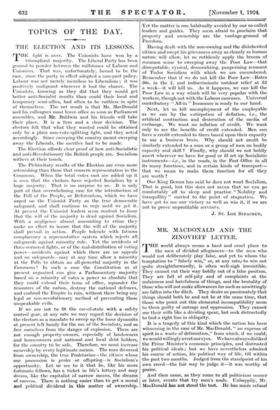TOPICS OF THE DAY.
THE ELECTION AND ITS LESSONS.
IT1HE fight is over. The Unionists have won by a 11 triumphant majority. The Liberal Party has been ground to powder between the millstones of Labour and Unionism. That was, unfortunately, bound to be the case, since the party in effect adopted a non-pact policy. Labour was not merely merciless to Liberalism ; it was positively malignant wherever it had the chance. The Unionists, knowing as they did that they would get better anti-Socialist results than could their local and temporary semi-allies, had often to be ruthless in spite of themselves. The net result is that Mr. MacDonald and his colleagues must leave office as soon as Parliament assembles, and Mr. Baldwin and his friends will take their place. It is a firm and a clear decision. The electors felt that what they wanted could be obtained only by a plain non-vote-splitting fight, and they acted accordingly. Since sweeping the country meant sweeping away the Liberals, the sacrifice had to be made.
The Election affords clear proof of how anti-Socialistic and anti-Revolutionary the British people are. Socialism withers at their touch.
The Plebiscitary results of the Election are even more astonishing than those that concern representation in the Commons. When the total votes cast are added up it is seen that the electors have rejected Socialism by a huge majority. That is no surprise to us. It is only part of that overwhelming case for the introduction of the Poll of the People, or Referendum, which we have urged on the Unionist Party as the true democratic safeguard, and shall continue to urge until we get it. At present the. Unionist leaders seem content to know that the will of the majority is dead against Socialism. With a negligence almost amounting to crime they make no effort to insure that the will of the majority shall prevail in action. People tolerate with fatuous complacency a representative system which rejects all safeguards against minority rule. Yet the accidents of three-cornered fights, or of the mal-distribution of voting power—accidents against which there are no appeals and no safeguards—may at any time allow a minority at the Polls to obtain an all-powerful majority in the Commons ! In such a case the Constitution as at present organized can give a Parliamentary majority based on a minority of votes a power so absolute that they could extend their term of office, squander the resources of the nation, destroy the national defences, and embroil the Empire in ruin, without there being any legal or non-revolutionary method of preventing those unspeakable evils.
If we are not to fit the car-of-state with a safety control gear, at any rate we may regard the decision of the electors as a mandate to sweep up the loose dynamite at present left handy for the use of the Socialists, and so free ourselves from the danger of explosion. There are not enough property-owners, especially of landowners and houseowners and national and local debt holders, for the country to be safe. Therefore, we must increase ownership by every legitimate means. The man divorced from ownership, the true Proletarian—the citizen whose one possession is proles or offspring--is Socialism's opportunity. Let us see to it that he, like his more fortunate fellows, has a ticket in life's lottery and may dream, like the capitalist of narrow means, the dreams of success. There is nothing easier than to get a moral and political dividend in this matter of ownership. Yet the matter is one habitually avoided by our so-called leaders and guides. They seem afraid to proclaim that property and ownership are the vantage-ground of Freedom.
Having dealt with the non-owning and the disinherited citizen and swept his grievances away as cleanly as human nature will allow, let us ruthlessly apply the broom of common sense to sweeping away the Poor Law—that disreputable, cynical, demoralizing, pauperizing remnant of Tudor Socialism with which we are encumbered. Remember that if we do not kill the Poor Law—Rates 30s. in the £, and indiscriminate outdoor relief at £2 a week—it will kill us. As it happens, we can kill the Poor Law in a way which will be very popular with the workers, though not with the Labour caucuses. Universal contributory " All-in " Insurance is ready to our hand.
Next, let us kill unemployment of the employable as we can by the extirpation of deflation, i.e., the artificial contraction and desiccation of the media of exchange. We want no inflation of credit. We want only to see the benefits of credit extended. Men can have a credit extended to them based upon their capacity to use a business brain. Why should not credit be similarly extended to a man or a group of men on bodily capacity and skill ? Finally, why should we not boldly assert wherever we have for good or ill set up Socialistic instruments—i.e., in the roads, in the Post Office in all its many functions, and in certain kinds of transport— that we mean to make them function for all they are worth ?
Our King Demos has said he does not want Socialism. That is good, but this does not mean that we can go comfortably off to sleep and practise " Nobility and tranquillity " carried to the point of stagnation. We have got to use our victory as well as win it, if we are not to prove unprofitable servants.
J. ST. LOE STRACIIEY.










































 Previous page
Previous page